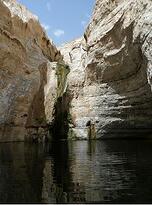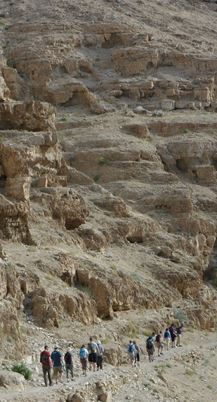 One thing I learned while in Israel was the significance of the land itself.
One thing I learned while in Israel was the significance of the land itself.While travelling around Turkey last summer, I learned the importance of knowing the historical and cultural context of the Bible, but something I had not experienced was the critical centrality of the Bible’s geographical context.
I will give you an example of what I mean:
In the Old Testament, one particular passage we give a lot of thought to is Exodus 3:8, “So I have come down to rescue them from the hand of the Egyptians and to bring them up out of that land into a good and spacious land, a land flowing with milk and honey…”
To me, and I’ll assume to most of you as well, this overly-used phrase in our Christian vocabulary has always been representative of a land filled with plenty and an abundance of God’s blessing, which lacks nothing – without hardship and without want. How is it then that the Israelites, who experienced drought and famine and so many other extreme circumstances, underwent all of this while INSIDE the Promised Land?

While there is more green land up in the north by Galilee, I have to admit that for the rest of Israel, “a land flowing with milk and honey” seems rather contradictory. In fact, the majority of Israel – a land of deserts and rocks and severity – seems to be anything but a land of blessing.
The answer to this apparent contradiction lies in the phrase itself. Milk… AND honey. There is a duality to this phrase that is not often thought about and this duality is found in the two products mentioned.
Honey: where does it come from? Well, yes, bees… but that’s actually probably not what the passage is referring to. Very likely it is talking about the “honey” of the date palm, which is found primarily in the north of Israel in the region of Galilee (a very green and fertile area).
Milk: where does it come from? Think really hard about this one… think you got the answer? Good. And who takes care of these animals? That’s right! Shepherds! And where does this take place? It takes place in the wilderness… a.k.a. the desert. (Not really the picture we have in our minds from Psalm 23, is it?)
Thus, when the Exodus passage refers to Milk and Honey, it is not simply talking about a land of plenty; it is talking about a land of diversity where harsh conditions are often a way of life.

In Deuteronomy 11:10-11 this is made very clear: “The land you are entering to take over is not like the land of Egypt, from which you have come, where you planted your seed and irrigated it by foot as in a vegetable garden. But the land you are crossing the Jordan to take possession of is a land of mountains and valleys that drinks rain from heaven”. There it is again: mountains and valleys… severity and abundance …milk and honey.
An interesting side note is that this idea of duality is visible all throughout the Old Testament. For example, a phrase that is used in Judges 20:1 and 1 Samuel 3:20 to refer to the Israelites in their entirety is “from Dan to Be’er Sheva (Beersheba)”. This phrase is usually seen as referring to these places locationally; however, it is also significant to know that this passage is referring to these places topographically. Dan, in the north of Israel, is as green as the land gets and Be’er Sheva is in the middle of the desert. Thus, this phrase is referring to ALL the people of Israel – no matter WHERE they live or HOW they live.
But going back to Deuteronomy, we see that the land God has promised the Israelites is not entirely appealing and, in contrast, the land of Egypt with its irrigation ditches from the Nile (where the Israelites would literally water their plants by foot) begins to look pretty good!
So then WHY does God bring his chosen people to a land that is primarily desert? Simply put: it was because this land – the Promised Land – was not about abundance, it was about faith. God did not bring them to a land where they had everything they wanted; he brought them to a land where they would have to trust him to provide everything they needed.

It’s not like water was lacking in other areas of the ancient Middle East… just head back down south to Egypt or East over to the flowing waters of the Tigris and the Euphrates!
But this land was different and it had no such water source… the people who lived here would have to trust God to bring down rain from heaven.
The Deuteronomy passage continues: “It is a land the LORD your God cares for; the eyes of the LORD your God are continually on it from the beginning of the year to its end. So if you faithfully obey the commands I am giving you today – to love the LORD your God and to serve him with all your heart and with all your soul – then I will send rain on your land in its season [but if you turn away] then the LORD’s anger will burn against you, and he will shut the heavens so that it will not rain” (Deut. 11:12-17).
This land was important to God – it was a land with a “divine agenda” and its purpose was to bring the people closer to God.
Gary M. Burge says it well in his book The Bible and the Land: “God’s plan does not move his people into a place where comfort and safety can be engineered such as Egypt or Mesopotamia. He gives the tribes of Israel a land that is dependent on him for sustenance. It is a land where prayer for rain – as prayer for anything that sustains life – would be a regular occurrence” (30).
To live in this land is to live a life of faith.
Kathryn Bennallack is a full time student at Ambrose, heading into her 5th and final year of the Christian Studies program with a focus on Spirituality and a double minor in English Literature and Business Administration. Kathryn has enjoyed her studies at Ambrose over the last few years and has been inspired by her professors to dig deeper into her faith and to continually seek out learning opportunities. Kathryn loves reading, photography, spending time with her family and friends and exploring new places wherever and whenever she can! Having grown up on the west coast of Canada in Victoria BC, Kathryn has a deep love for the ocean and legitimately does enjoy long walks on the beach! Kathryn is passionate about travel and one of her life goals is to travel to every country in the world. Another goal? to grow in relationship with her Lord and Saviour, Jesus Christ at every opportunity.








